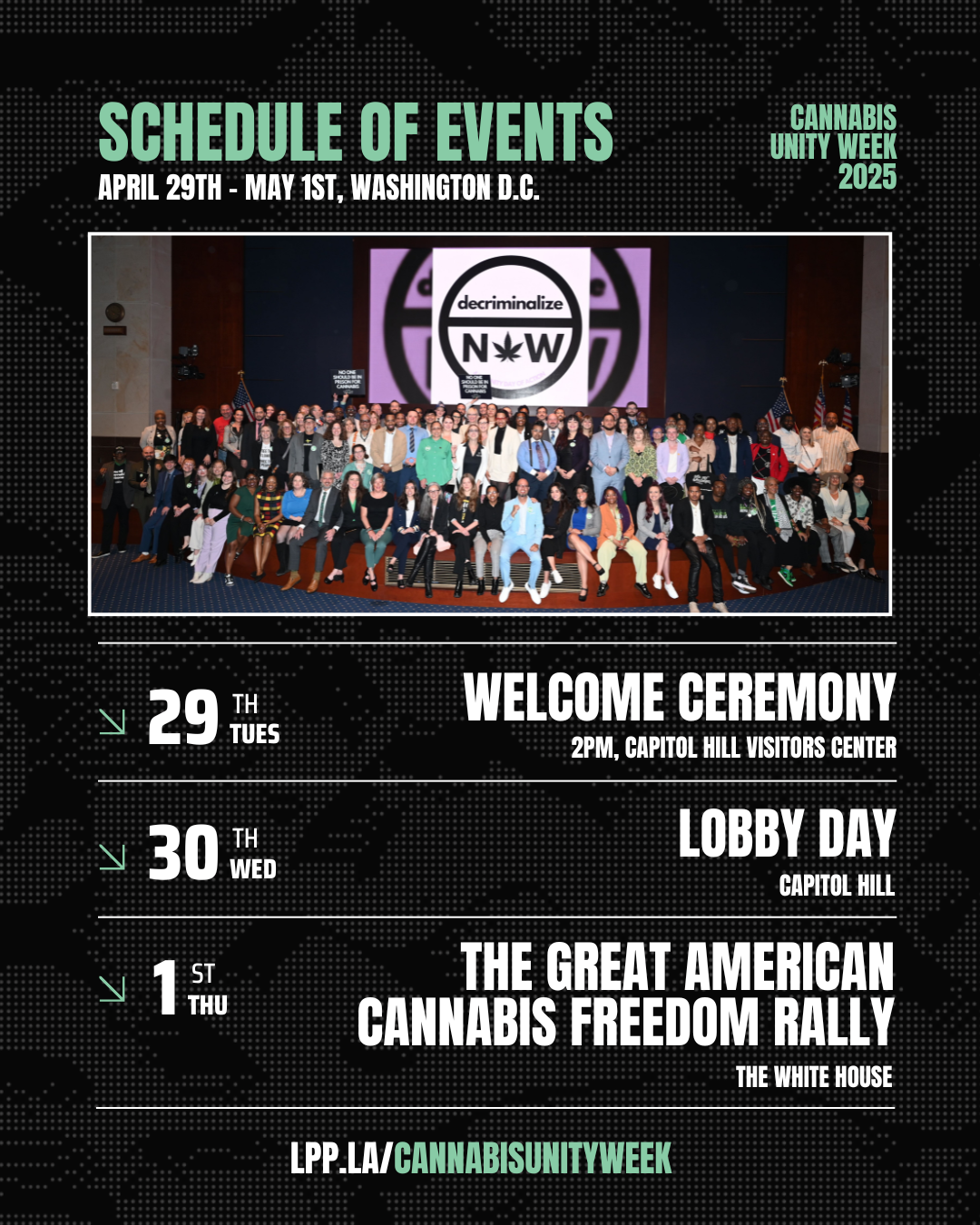Cannabis Unity Coalition to Return to Capitol Hill for 2nd Annual Unity Week of Action April 28th to May 1st
Wednesday, February 26th (Washington D.C.) - Despite significant progress in cannabis legalization at the state level, tens of thousands of people remain incarcerated for cannabis-related offenses, licensed cannabis businesses are struggling, and community uplift funds are stalled. With 24 states and Washington D.C. legalizing adult-use cannabis and the federal government cannabis’s reclassification process in limbo, the fight for full legalization and retroactive relief is more urgent than ever.
To mobilize the 70% of the public that supports legalization into political pressure, the Cannabis Unity Coalition, the largest bipartisan coalition of cannabis advocacy, industry, and grassroots organizations, is mobilizing for the Cannabis Unity Week of Action, taking place April 29th - May 1st, 2025, in Washington, D.C. This multi-day event will unite advocates, impacted individuals, and industry leaders to pressure Congress and the Trump administration to fully legalize cannabis and implement retroactive relief measures for those affected by prohibition-era policies.
The week will start on Tuesday with a congressional press conference in the morning followed by a welcome ceremony in the U.S. Capitol Visitor Center starting at 2pm. Wednesday will be dedicated to our Lobby Day where attendees will meet with their elected officials on Capitol Hill to advocate for cannabis reform. Lastly, events will conclude Thursday evening with an action outside the White House to honor those still incarcerated for cannabis and demand their freedom via presidential clemency.
The Cannabis Unity Coalition is made up of a broad array of advocate groups that span across political boundaries and includes members of the Marijuana Justice Coalition (MJC) like Drug Policy Alliance (DPA), National Organization for the Reform of Marijuana Laws (NORML), Veterans Cannabis Coalition, and Parabola Center; members of the Cannabis Freedom Alliance (CFA) like the Reason Foundation and Law Enforcement Action Partnership (LEAP); Students for Sensible Drug Policy (SSDP), which is a member of both coalitions; and industry groups like National Cannabis Festival, National Craft Cannabis Coalition, National Cannabis Industry Association (NCIA), Minority Cannabis Business Association (MCBA), Indigenous Cannabis Industry Association (ICIA), Asian Cannabis Roundtable, and National Association of Black Cannabis Lawyers (NABCL), FreedomGrow, Marijuana Justice, Doctors for Drug Policy Reform, United Food and Commercial Workers (UFCW) , Supernova Women, Minorities for Medical Marijuana, Midwest Cannawomen, DCMJ, Just Leadership USA (JLUSA), National Association of Criminal Defense Lawyers, and Marijuana Policy Project (MPP).
For 2025, in addition to Mission Green, other organizations that have joined us for this year include the Balanced Veterans Network, Latinas in Cannabis, the Equity Trade Network, Cannademix, and Free My Weed Man.
“It’s beyond time to legalize cannabis nationwide and expunge records for those incarcerated for cannabis-related offenses,” said
Congresswoman Ilhan Omar (MN-05), newly elected co-chair of the Congressional Cannabis Caucus. "I’m incredibly grateful for the partnership of the members of the Cannabis Unity Coalition and look forward to working together to get this done."
Eric Goepel of the Veterans Cannabis Coalition said "Considering the staggering rates of chronic and infectious disease, suicide, and overdose in the US, especially among veterans, we need every tool at our disposable. Cannabis and cannabinoids have immense potential to revolutionize medicine and reduce harm, but that can only be fully achieved through marijuana descheduling, smart legalization, and research funding. We look forward to centering the needs of patients and consumers as part of Unity Week and working with allies to bring critical information to Congress."
“As a career law enforcement official, I’ve witnessed firsthand the failed policies of the War on Drugs and the waste of police time and resources that have followed,”
said Lieutenant Diane Goldstein (Ret.), Executive Director of the Law Enforcement Action Partnership. “It’s time to end marijuana prohibition once and for all, so that we can free up law enforcement to focus on the biggest threats to public safety, instead of low-level arrests and enforcement that only damage community relations and make it harder for us to do our jobs.”
“Cannabis prohibition has destroyed lives, torn families apart, and fueled mass incarceration. Ending it is not just about policy—it’s about justice. We must fully repeal prohibition, expunge records, and free those still behind bars,” said
Weldon Angelos, Founder of The Weldon Project & Mission Green, who also had previously been pardoned by President Trump for his cannabis conviction.
“It is not enough to simply treat the symptoms of bad cannabis policy; we must fix the problem at its root cause. We can start by stopping arrests today, by releasing all cannabis prisoners and removing the significant barriers to their successful reintegration into our society, and by ending marijuana prohibition once and for all,” said
Kat Murti, Executive Director, Students for Sensible Drug Policy (SSDP). “Young people have always been some of the biggest casualties of the War on Drugs. The War on Drugs is a War on Us and we will no longer stand by passively and allow it to be fought in our name.”
Sarah Gersten, Executive Director of Last Prisoner Project said, "Cannabis prohibition has devastated countless lives and disproportionately impacted communities of color. We must ensure that justice for those still incarcerated for cannabis-related offenses is part of legalization. Cannabis Unity Week represents a powerful opportunity to unite advocates, industry leaders, and impacted families to demand comprehensive reform, including retroactive relief and clemency.”
As more organizations join our fight, individuals interested in attending Cannabis Unity Week can
sign up for updates here. Additionally, you can join one of our information sessions on
March 5th and
April 2nd at 6:30pm EST,
sign up here to attend.
Those who can’t join us in D.C. can still participate virtually by
contacting your federal representatives to #DecriminalizeNow,
urging your governor to grant clemency to those in your state, and following along through livestream. Learn more and take action at
LPP.la/CannabisUnityWeek.
Press contact:
Stephen Post
LPP Communications Manager
stephen@lastprisonerproejct.org







